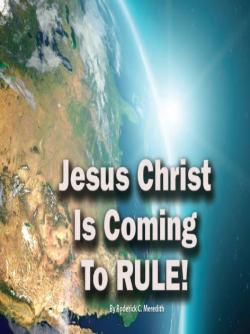The Sabbath Controversy
Does it matter whether you gather with other Christians to worship on the first day of the week or the seventh? What can we learn from Jesus' own example?
Does it matter which day you call your Sabbath? What does Scripture say?
The world’s religions set aside different days as holidays and times of worship. While most of the world’s 2.1 billion professing Christians worship on Sunday, 1.3 billion Muslims keep Friday as their weekly day of worship. Millions of Jews observe the Sabbath—their day of rest and worship—from sunset on Friday through sunset on Saturday.
Does it matter which days we observe? And does God care when we worship Him, as long as we do worship Him? Most professing Christians just accept whatever their parents or church taught them as tradition. Until I was a young adult, that is what I did, too. When I was a young boy, I asked my mother, “Why do we keep Sunday, when the fourth commandment in the Bible teaches us to keep the Sabbath, the seventh day?” She gave me some vague answer, which I accepted at the time. But can you answer that question? Which day is the Christian Sabbath?
Where do today’s professing Christians get the idea that Sunday is the Christian day of worship? You may be shocked to learn that some religious sects teach that their church’s tradition carries more authority than the Bible! Notice this statement from Anglican theologian Isaac William: “Where are we told in Scripture that we are to keep the first day at all? We are commanded to keep the seventh; but we are nowhere commanded to keep the first day…. The reason why we keep the first day of the week holy instead of the seventh is for the same reason that we observe many other things, not because the Bible, but because the church, has enjoined it” (Plain Sermons on the Catechism, vol. 1, pp. 334, 336).
Is William right? Does the Bible—the word of God—carry less weight than church tradition? What example did Jesus Christ set? Notice what the Bible says about Jesus’ own practice at the start of His ministry. “So He came to Nazareth, where He had been brought up. And as His custom was, He went into the synagogue on the Sabbath day, and stood up to read” (Luke 4:16).
Yes, it was Jesus’ regular custom to worship on the Sabbath! What day of the week was that? Since the time of Jesus, and centuries before, the Jewish community has very carefully documented its observance of the seventh-day Sabbath, from sunset Friday through sunset Saturday. We know from thousands of carefully kept records that the seven-day cycle of the week has not been broken since Jesus’ time. Those who worship on the seventh day today are worshiping on the same day Jesus did!
Ask yourself: did Jesus set His example of keeping the Sabbath, and all the biblical precepts, so that we would not need to? Shockingly, this is what many preachers teach today! But did Jesus even once tell His followers to ignore His example? No! Not only did Jesus keep the commandments, He instructed others to keep them as well, saying, “if you want to enter into life, keep the commandments” (Matthew 19:17). Jesus’ answer clearly showed He was speaking of the Ten Commandments.
Paul’s Example
We have seen that it was Jesus’ practice to observe the Sabbath. Did the Apostle Paul—the “apostle to the Gentiles”—observe the Sabbath, or did he set an example showing that Gentile Christians need not do so? Remember, Paul was trained as a Pharisee, and knew Scripture very well. When Paul was in Greece, in the city of Thessalonica, he preached for three Sabbaths in a row to the Jews in the synagogue. Notice that this was Paul’s custom—he regularly preached on the Sabbath. “Then Paul, as his custom was, went in to them, and for three Sabbaths reasoned with them from the Scriptures, explaining and demonstrating that the Christ had to suffer and rise again from the dead, and saying, ‘This Jesus whom I preach to you is the Christ’” (Acts 17:2–3).
So, we see that Paul regularly preached to the Jews on the Sabbath. But did he also speak to the Gentiles on the Sabbath? Notice what he did in the Gentile city of Corinth, in Greece. “And he reasoned in the synagogue every Sabbath, and persuaded both Jews and Greeks” (Acts 18:4)! Yes, Paul preached to the Gentiles on the Sabbath!
If Paul expected Christians to keep a Sunday observance instead of the seventh-day Sabbath, we might expect him to speak to Christians—at the very least, to the Gentiles—on Sunday. Is that what your Bible shows he did? Notice Paul’s example in Antioch, in what is today the nation of Turkey. What happened after Paul’s usual Sabbath sermon to both Jews and devout Gentiles in the synagogue? “So when the Jews went out of the synagogue, the Gentiles begged that these words might be preached to them the next Sabbath” (Acts 13:42).
If Jesus or the apostles had changed the commanded day of worship to Sunday, here was a perfect opportunity for Paul to tell the Gentiles, “No, you don’t have to wait until next Saturday, we Christians now worship on Sunday. Meet with us tomorrow!” But he did not do that! What does your Bible say? “On the next Sabbath almost the whole city came together to hear the word of God” (Acts 13:44). Paul taught the Gentile Christians on the Sabbath! He also commanded the Gentile Corinthians to follow his example. Remember Paul’s instruction, “Imitate me, just as I also imitate Christ” (1 Corinthians 11:1). Or, “Follow my example, as I follow the example of Christ” (NIV). Yes, Paul, Jesus, and the apostles set an example for all Christians in observing the Sabbath!
Why the Change?
Since the example of Christ and the apostles is clear, we may wonder: when did “mainstream” Christianity begin to observe Sunday instead of the seventh-day Sabbath as a day of rest? Notice: “Tertullian (202ad) is the first writer who expressly mentions the Sunday rest: ‘We, however (just as tradition has taught us), on the day of the Lord’s Resurrection ought to guard not only against kneeling, but every posture and office of solicitude, deferring even our businesses lest we give any place to the devil’” (article: “Sunday,” The Catholic Encyclopedia). That was not until 202ad, more that 170 years after the death, burial, and resurrection of the Messiah, Jesus Christ!
But was Sunday in fact the day of Christ’s resurrection? No! Notice the gospel account. When Mary Magdalene came to Jesus’ tomb on Sunday morning, she found it empty. She came while it was still dark (John 20:1), and Jesus was already gone! He had been buried just before sunset on Wednesday, right before the start of the High Holy Day beginning the Feast of Unleavened Bread. Christ had emphasized the key sign of His Messiahship as follows: “An evil and adulterous generation seeks after a sign, and no sign will be given to it except the sign of the prophet Jonah. For as Jonah was three days and three nights in the belly of the great fish, so will the Son of Man be three days and three nights in the heart of the earth” (Matthew 12:39–40). Christ promised to be in the tomb for 72 hours, meaning that He was resurrected shortly before sunset on Saturday!
The Roman emperor Constantine, however, had been a pagan sun-worshiper. During his rule, in the fourth century ad, he enforced Sunday worship throughout his empire. He gave the following edict in 321ad: “On the venerable day of the Sun let all magistrates and people ... rest” (article: “Sunday Legislation,” Schaff-Herzog Encyclopedia of Religious Knowledge).
Disobedience to the emperor’s command could mean death to Sabbath-keeping Christians. Just decades later, the Roman church then passed a startling decree at the Council of Laodicea. It declared: “Christians must not judaize by resting on the Sabbath, but must work on that day, resting rather on Sunday. But, if any be found to be judaizing [keeping God’s Sabbath], let them be declared anathema from Christ” (A History of the Councils of the Church, p. 316). Christian Sabbath-keepers were labeled as heretics.
Both the government and the church moved against Christian Sabbath-keepers. Yet the true Christianity of the first century—which never stopped following Christ’s example of keeping the fourth commandment—has continued to this day, in spite of persecutions over the centuries. Many in the United States today forget that many of the first American settlers crossed the Atlantic Ocean in the 17th century in search of religious freedom in the colonies of North America. Thousands came to Rhode Island to take advantage of its royal charter, granted in 1663 by King Charles II of England, which guaranteed religious freedom in the colony. To this day, that charter remains on display in the Providence, Rhode Island statehouse.
Seventh-day Sabbath-keepers were among those who came to Rhode Island seeking religious freedom. Stephen Mumford and his wife, who came to Newport, Rhode Island in 1665, were the first Christian Sabbath-keepers documented to have settled in Rhode Island. Others followed, and by 1729 their group had expanded so much it needed a larger meeting hall. That hall, built in 1729, is still being preserved by the Newport Historical Society.
If you are ever in Newport, Rhode Island, you may want to visit that historic building. Inside the hall is a raised pulpit. Behind the pulpit are two large plaques, inscribed with the Ten Commandments. At the bottom of the second plaque is the Apostle Paul’s bold statement, “Do we then make void the law through faith? God forbid: yea, we establish the law” (Romans 3:31, KJV). Yes, these New Testament Christians affirmed their allegiance to Christ’s statement, “But if you want to enter into life, keep the commandments.” These Christians correctly understood that Jesus’ teachings insisted that His followers observe and obey the Ten Commandments!
Sabbatarian church records, preserved in the Newport Historical Museum, contain members’ names and contributions. Significantly the church describes itself in those records as “keeping the commandments of God, and the faith of Jesus, and in particular the Lord’s Seventh-Day Sabbath.”
Some seventh-day Sabbath-keepers were prominent citizens of Rhode Island in the 18th century. Two of the colony’s governors—Richard Ward and his son Samuel—were seventh-day Sabbath-keepers. Even the first president of Brown University—James Manning—was a Sabbatarian!
The Sabbath Before Moses?
Some today believe Sabbath observance was instituted as a Jewish custom at Mount Sinai, when Moses received the tablets containing the Ten Commandments. Is this so? No! Notice how your Bible describes what is called “creation week.” We read that God created man and woman on the sixth day. What then happened on the seventh day? “Thus the heavens and the earth, and all the host of them, were finished. And on the seventh day God ended His work which He had done, and He rested on the seventh day from all His work which He had done. Then God blessed the seventh day and sanctified it, because in it He rested from all His work which God had created and made” (Genesis 2:1–3).
Yes, the seventh-day Sabbath is a memorial of the creation—and it points to the true God and true Creator of the universe. It had meaning from the very creation, and it still has deep meaning for Christians today, who recognize the seventh-day Sabbath as a foreshadowing of Jesus Christ’s thousand-year reign on planet Earth during the Millennium.
What did Jesus claim about His relationship to the Sabbath? Did He say He was Lord over Sunday—that Sunday was the Lord’s day? No! Jesus said, “The Sabbath was made for man, and not man for the Sabbath. Therefore the Son of Man is also Lord of the Sabbath” (Mark 2:27–28). If Jesus is Lord of the Sabbath, what day is the Lord’s day? Sunday? No! The Sabbath is the Lord’s Day—Jesus Himself said so! In fact, the expression “Lord’s Day” appears only once in the Bible, in Revelation 1:10. There, it refers to the prophetic period known as the Day of the Lord, which leads up to the Second Coming of Christ. It does not refer to a day of the week.
The book of Hebrews depicts the Sabbath as a foreshadowing of the earth’s millennial rest, as well as a memorial of God’s rest at creation. Regarding the ancient Israelites’ disobedience on their way to the promised land, we read, “For if Joshua had given them rest, then He would not afterward have spoken of another day. There remains therefore a rest for the people of God” (Hebrews 4:8–9). The original Greek word for “rest” in verse 9 is sabbatismos, which means “a Sabbath-keeping” (see Vine’s Expository Dictionary of Biblical Words). Both the Revised Standard Version and the New International Version translate verse 9 as “a Sabbath rest.”
Yes, there remains a Sabbath rest for the people of God, even to this day! But is it merely a symbolic rest, or is it a literal Sabbath rest? If you have access to a copy of the Anchor Bible Dictionary, you can see for yourself that in other contexts, including secular Greek writings not dependent on this verse from Hebrews, that sabbatismos plainly and literally means “Sabbath observance” or “Sabbath celebration.” There is no question that this verse is a New Testament statement about a literal Christian observance of the Sabbath!
If Christians are to cease from their works, just as God ceased from His (Hebrews 4:10), we must ask: how did God cease from His works? Scripture gives us the answer: “For He has spoken in a certain place of the seventh day in this way: ‘And God rested on the seventh day from all His works’” (Hebrews 4:4).
There is no guessing here! New Testament Christians are supposed to rest just as God rested—on the seventh day! Both the Old Testament and the New Testament give Christians the clear example and instruction to keep the Sabbath day holy! If you consider the Bible your authority, rather than some church tradition that claims to overrule the Bible, you have no other choice! So, what is your authority?
Scripture or Tradition?
Earlier in this article, we read one Anglican theologian’s plain admission that it was church tradition, rather than Scripture, which brought about a Sunday observance in place of the seventh-day Sabbath. Other theologians concur. Noted Roman Catholic theologian James Cardinal Gibbons wrote, in his book Faith of Our Fathers, the following bold statement: “But you may read the Bible from Genesis to Revelation, and you will not find a single line authorizing the sanctification of Sunday. The Scriptures enforce the religious observance of Saturday, a day which we never sanctify.” Gibbons admits that if the Bible is your authority, you have no basis for observing Sunday. Scripture, as he writes, enforces “the religious observance of Saturday.” Gibbons acknowledges that it was the Council of Laodicea in the fourth century ad—not the pages of your Bible—that caused the professing Christian world to change from the seventh-day Sabbath to a Sunday observance.
Similarly, prominent Southern Baptist minister Harold Lindsell, a former editor of Christianity Today magazine, wrote: “There is nothing in Scripture that requires us to keep Sunday rather than Saturday as a holy day” (“Consider the Case for Quiet Saturdays,” Christianity Today, November 5, 1976, p. 42).
What should you do? You need to study your Bible and decide whether you will live by “every word of God” as Jesus admonished us in Matthew 4:4 and Luke 4:4. Jesus said He is Lord of the Sabbath. He observed the seventh-day Sabbath regularly, and He did not break the law. As He said, “I have kept My Father’s commandments” (John 15:10). Will you follow the example of Jesus Christ and the instructions of your Bible? Or will you oppose them, in order to follow the tradition of men?
In God’s Kingdom, everyone will keep the seventh-day Sabbath (Isaiah 66:22–23). What a wonderful world that will be. But, even today, Jesus Christ is Lord of the Sabbath (Mark 2:28). And He has not changed. “Jesus Christ is the same yesterday, today, and forever” (Hebrews 13:8). True Christians, in their lives today, seek to follow the example He set. What will you do?






